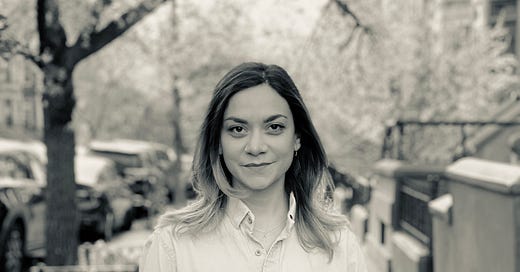Instrument, Surface, Setting, Story: An Interview Series on Creative Tools and Spaces with Sammi LaBue
"Something about reading a piece that way changes the perspective, so that I feel more like its reader than its writer, which makes me a better editor."
Recently during a journaling workshop I participated in, the conversation turned to writing supplies and which journals, pens, and writing environments each of us prefer. The conversation went on for almost an hour and I realized once we’d moved on that I could have listened to other writers and artists talk about their chosen supplies all night. I decided to reach out to the creatives in my life to ask them about four components of their creative process, and I am so grateful for the generous responses they provided. I can’t wait to share them all with you.
Instrument: What writing tool do you use? Pen? Pencil? Tablet? Or do you go old-school with a quill and ink?
I'm a big proponent of handwriting a first draft. When I was young I felt it was so important to use a yellow legal pad and a blue ballpoint pen. I still find that preferable if I use paper, but my students know I now use my beloved iPad and iPencil in the Notability app. I've been a full time freelance writer and teacher who writes with others through my business Fledgling Writing Workshops since 2017, so the notebook organization was getting to be impossible. I'd write something in one workshop then lose it for days.
Notability is the GOAT because of its search capabilities with even the messiest handwriting. I recommend it to anyone. Still I change the settings to a yellow ruled paper and use blue "ink."
Nowadays though I'm done with the ballpoints and on to Japanese gel tip pens like the ones at Muji if I write on paper.
Surface: What do you write on? A lined paper journal? Dotted? Grid? Do you flip the page sideways or write long-ways?
If you do go the iPad route, you must invest in a Paperlike screen protector. It gives your pen that satisfying drag, that is well, paperlike.
I will say I still prefer to write on paper when I write outside (which I'm want to do) and will use any notebook I have when I write by a vacation lake or in my Brooklyn backyard (writers get lots of notebooks as gifts and they are appreciated).
I also use a paper planner. I had a hipster Moleskine phase and a Type A Erin Condren phase, but now I'm a Mossery girlie, because their simplicity works for my ADD, overstimulated, overambitious mommy mind. Plus, their designs are very cute and often witchy.
Setting: Where do you create? An office? From bed? On the couch? Is it silent, or do you need background noise like music (with or without lyrics)?
I would write in a boat, with a goat, in the rain, on a train. Sam-I-am after all. No, but really every day is different.
I tend to like to keep certain projects to certain places for the ritual of returning to the story. Place is important to my practice. The vibes have to be right.
I have an at home office I'm very grateful for. She's new, she's terracotta orange which reminds me of the Southwest and Colorado where I’m from, and there are big flowers that double as sound dampeners on the walls. This is mostly for the people on the other side. I believe in reading work aloud while editing. When I need to really get down to business I go to my coworking space in Manhattan called The Writers Room. Everyone is in cubicles working on their writing around you. There are no cell phones, food, or talking allowed. It's like a writing deprivation tank and it does wonders for procrastination. I've been going for almost a decade and it's definitely my home base in the city.
I tend to have big storms of ideas while walking my dog so my notes app gets a lot of action. Sometimes I also draft in voice memos when my thoughts are running away from me. Once I type something up, I always use Google docs so that I can work on the subway, which I do pretty often, especially when final drafting. I continuously think of tweaks and love to just whip out my phone to finesse a piece.
Something about reading a piece that way changes the perspective, so that I feel more like its reader than its writer, which makes me a better editor.
Story: Describe your perfect writing day in three sentences or less.
No one speaks to me when I wake up and I go straight to my desk in pajamas to start cranking, building off a prompt response from a workshop or rough draft from 8am until 11.
Then I forget about writing and ever being a writer for a few hours, exercising, eating, then going for a long walk.
From 2-4 I'm back at my desk dialing the morning's work and expanding, before eking out one more hour of writing to a prompt to develop new stuff, before watching an inspiring movie or reading a damn good book.





